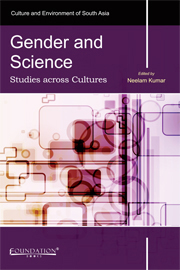Book contents
- Frontmatter
- Contents
- List of Contributors
- Acknowledgements
- Introduction: Reflections and Realities across Cultures
- Section I Approaches and Perspectives
- 1 Getting More Women into Science: Knowledge Issues
- 2 Gender Imbalance in Science: Cultural Similarities and Diferences
- 3 Gender and Technology
- 4 Gender, Science, and the Psychology of Science
- 5 Women and Minorities in Science: Discrimination and the Solution
- Section II Illustrative Examples
- Conclusion: The Persistent Patterns!
- Bibliography
- Index
4 - Gender, Science, and the Psychology of Science
from Section I - Approaches and Perspectives
Published online by Cambridge University Press: 05 May 2013
- Frontmatter
- Contents
- List of Contributors
- Acknowledgements
- Introduction: Reflections and Realities across Cultures
- Section I Approaches and Perspectives
- 1 Getting More Women into Science: Knowledge Issues
- 2 Gender Imbalance in Science: Cultural Similarities and Diferences
- 3 Gender and Technology
- 4 Gender, Science, and the Psychology of Science
- 5 Women and Minorities in Science: Discrimination and the Solution
- Section II Illustrative Examples
- Conclusion: The Persistent Patterns!
- Bibliography
- Index
Summary
Given its stature as a transformative influence on society, science is and ought to be an object of intense study. Philosophers, historians, and sociologists devote systematic attention to questions such as what distinguishes scientific from non-scientific knowledge; what is the historical context to great scientific discoveries, such as the theory of evolution or quantum mechanics; and what are the sociological and political forces behind becoming a ‘have or a have-not’ in science. What is conspicuously absent – at least until the mid 1980s – from these studies of science (metasciences) is psychology (Feist, 2006; Feist and Gorman, 1998). This is all the more puzzling, given the fact that philosophers, historians, and even sociologists of science of ten touch on inherently psychological processes in their writings on science and scientists, such as imagination, creativity, thought processes, social influence, and motivation. As recently as 1985, there was little accumulated knowledge concerning topics in psychology of science. As Mahoney wrote in the late 1970s: ‘In terms of behaviour patterns, affect, and even some intellectual matters, we know more about alcoholics, Christians, and criminals than we do about the psychology of the scientist’ (Mahoney, 1979: 349). In contrast, other disciplines like philosophy, history, and sociology have spawned clearly identifiable and established sub-disciplines devoted to science studies. Because science deserves more attention from psychologists, one aim of this chapter is to show how the psychology of science can contribute to important questions concerning scientific and mathematical behaviour; in this case how gender affects interest in and ability towards math and science.
- Type
- Chapter
- Information
- Gender and ScienceStudies across Cultures, pp. 61 - 75Publisher: Foundation BooksPrint publication year: 2012

